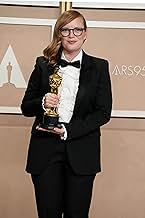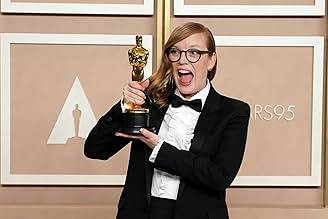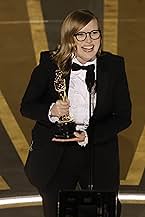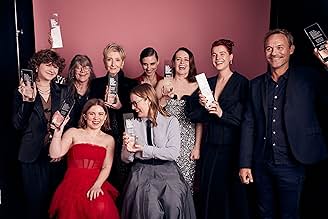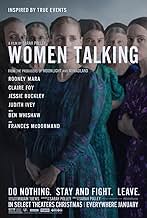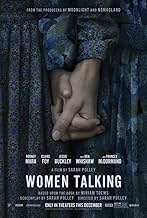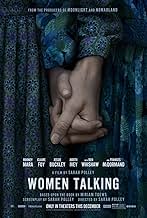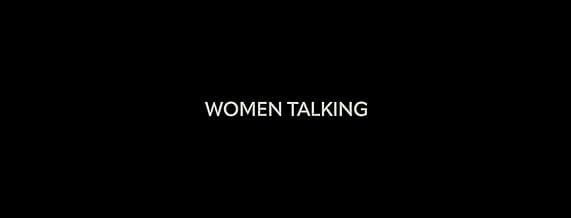Do nothing, stay and fight, or leave. In 2010, the women of an isolated religious community grapple with reconciling a brutal reality with their faith.Do nothing, stay and fight, or leave. In 2010, the women of an isolated religious community grapple with reconciling a brutal reality with their faith.Do nothing, stay and fight, or leave. In 2010, the women of an isolated religious community grapple with reconciling a brutal reality with their faith.
- Won 1 Oscar
- 65 wins & 164 nominations total
- Director
- Writers
- All cast & crew
- Production, box office & more at IMDbPro
Featured reviews
You go to bed then wake up bruised, bloody, quite groggy and confused; you know instantly, that your body's been abused, your mind cannot conceive, all the torment and the grief, but you're not the only one, that's being used. So the women of the colony convene, to discuss the implications of what's been, carry on like there's no wrong, stay and fight which might prolong, or leave this place, put barriers between. The conversations, confrontations ebb and flow, the picture of what's taken place is shown, anguish, misery and despair, amongst a culture built on prayer, where the men have their own rules, their manifesto.
It's a wonderful piece of filmmaking that engages from the outset with great dialogue, a disturbing story, and an empowering conclusion - with outstanding performances throughout.
It's a wonderful piece of filmmaking that engages from the outset with great dialogue, a disturbing story, and an empowering conclusion - with outstanding performances throughout.
Sarah Polley's 'Women Talking' did not work for me. This story of a group of women - all of whom belong to a U. S. religious sect in the 1960's - who are physically and emotionally abused by their menfolk / husbands, seems more like a dispassionate, politically correct lecture, than a dialogue between real people. Real people in pain. And it should not have had that effect. Particularly in these times when the news is filled with detailed descriptions of what real men do to real women.
Rooney Mara, Claire Foy, and. Jesse Buckley play three young women who had been drugged and sexually accosted, and who are now part of a 'commission' asked to decide what the community's women's next steps should be. Should they remain in the community and say / do nothing, remain and fight back, or pack up and leave? In making their decision, each of the three young women describes their lives and their reasons for voting as they do. Rooney Mara's character seems the most undecided, willing to see all sides of the argument and taking different positions over the course of the film. Claire Foy is angry and outspoken but I found it difficult to ascribe a preferred next-step to her. Jesse Buckley is the angriest and, at first, the most unwilling to leave her abusive husband, and it is that - her failure to realize how abused she is - that made me care less about her than I should.
Two senior women participate in the commission and one, played by Judith Ivey - made the strongest impression on me. She has the wisdom that comes with age and the ability to put it into words. Ben Whishaw as the one man invited to the commission brings a startling honesty to the proceedings; he more than anyone knows the evil men can do.
But for me, the film's 'failure' involves the three young women. There is a cold and distanced quality to their recitals. It is as though they are relating a film they saw, a book they read, rather than expressing the anger, the anxiety, the fear they all know very well.
I should have been moved. I should have been angered. I should have been relieved. But I was not.
Rooney Mara, Claire Foy, and. Jesse Buckley play three young women who had been drugged and sexually accosted, and who are now part of a 'commission' asked to decide what the community's women's next steps should be. Should they remain in the community and say / do nothing, remain and fight back, or pack up and leave? In making their decision, each of the three young women describes their lives and their reasons for voting as they do. Rooney Mara's character seems the most undecided, willing to see all sides of the argument and taking different positions over the course of the film. Claire Foy is angry and outspoken but I found it difficult to ascribe a preferred next-step to her. Jesse Buckley is the angriest and, at first, the most unwilling to leave her abusive husband, and it is that - her failure to realize how abused she is - that made me care less about her than I should.
Two senior women participate in the commission and one, played by Judith Ivey - made the strongest impression on me. She has the wisdom that comes with age and the ability to put it into words. Ben Whishaw as the one man invited to the commission brings a startling honesty to the proceedings; he more than anyone knows the evil men can do.
But for me, the film's 'failure' involves the three young women. There is a cold and distanced quality to their recitals. It is as though they are relating a film they saw, a book they read, rather than expressing the anger, the anxiety, the fear they all know very well.
I should have been moved. I should have been angered. I should have been relieved. But I was not.
In 2010, the women of a Mennonite community must come together to make a decision following the discovery of a terrible secret of the men in their community. There are three options: do nothing, stay and fight, or leave. Great. The incipit is undoubtedly as interesting as it is a thriving ground for opening an important dialogue on concepts such as faith, misogyny, and feminism.
While it is an important film, and an important issue, I found the script to be profoundly insincere and artificial, in dialogue that is more like a skein of feminist slogans piled one after another. The way the characters express themselves, interact, and behave is mechanical and relegated to the stereotype of women they represent. To the most controversial character, McDormand's, I was sorry that, even in her being at fault, no space was left.
On a technical level there is nothing particularly significant; the coloring is interesting, if not particularly aesthetic. The performances of course were good, as the cast is mostly made up of great actresses.
Women Talking is commendable in its intended message, but otherwise it seems a wasted opportunity of cast as much as of reference material.
While it is an important film, and an important issue, I found the script to be profoundly insincere and artificial, in dialogue that is more like a skein of feminist slogans piled one after another. The way the characters express themselves, interact, and behave is mechanical and relegated to the stereotype of women they represent. To the most controversial character, McDormand's, I was sorry that, even in her being at fault, no space was left.
On a technical level there is nothing particularly significant; the coloring is interesting, if not particularly aesthetic. The performances of course were good, as the cast is mostly made up of great actresses.
Women Talking is commendable in its intended message, but otherwise it seems a wasted opportunity of cast as much as of reference material.
A group of women from a small religious community discuss various violent acts, beatings and rape.
It is a heavy going watch, a film that manages to intrigue, sicken and inform. Some of the content, some of what you'll hear will genuinely lower your opinion on human nature, the harrowing acts some people can commit.
The best element for me, the acting, if I had to pick out a standout, I'd argue Claire Foy did a supreme job, but the likes of Ben Wishaw and Frances McDormand were excellent also.
I feel like it plays out like a stage play, I can only imagine how powerful some of the content would play out in a small, intimate theatre, one or two bits maybe get a little lost in translation onto the big screen.
I've read some very impressive reviews about this film, some people have spoken candidly about first hand experience of violence, that has clearly given them a different perspective on the film.
At times I felt a little bit like an outsider looking in, and sometimes I couldn't relate, or get into it, some of the sequences felt just a tad slow, some threads were explored but not tied up, I suppose that's just normal in such circumstances.
It's definitely a powerful time, and one that's very, very relevant in today's day and age, a time where women's rights seem to be being downplayed somewhat.
I would recommend it.
7/10.
It is a heavy going watch, a film that manages to intrigue, sicken and inform. Some of the content, some of what you'll hear will genuinely lower your opinion on human nature, the harrowing acts some people can commit.
The best element for me, the acting, if I had to pick out a standout, I'd argue Claire Foy did a supreme job, but the likes of Ben Wishaw and Frances McDormand were excellent also.
I feel like it plays out like a stage play, I can only imagine how powerful some of the content would play out in a small, intimate theatre, one or two bits maybe get a little lost in translation onto the big screen.
I've read some very impressive reviews about this film, some people have spoken candidly about first hand experience of violence, that has clearly given them a different perspective on the film.
At times I felt a little bit like an outsider looking in, and sometimes I couldn't relate, or get into it, some of the sequences felt just a tad slow, some threads were explored but not tied up, I suppose that's just normal in such circumstances.
It's definitely a powerful time, and one that's very, very relevant in today's day and age, a time where women's rights seem to be being downplayed somewhat.
I would recommend it.
7/10.
The fact that the movie is set in 2010 and is based on a true story is not easy to believe. The way things unfold, one would think it is at least in the 50s at the latest for the most part. But the way some cults work, and how people fall for them and spend generations in them is a sad truth of our world. Even though it can be technically called a chamber piece, it doesn't feel like one. There's so much in writing and directing that adds novelty to the story which is not exactly something groundbreaking. There are little moments throughout the film that makes the situation more weird and real at the same time that most films don't do.
Did you know
- TriviaExplaining the color grading of the film, director Sarah Polley said the filmmakers played with saturation levels to create a feeling of "a world that had faded in the past." This is why the film appears to be almost black and white, but not quite.
- GoofsNettie identifies as a man name "Melvin". The Mennonite do not allow members to identify as anything other than their biological sex and gender. In real life, Nettie would have been excommunicated. There are over one hundred different Anabaptist (Amish, Brethren, Hutterite, Mennonite) church groups, counting more than 6,000 congregations, all holding to slightly different traditions and their own interpretations of the Bible. The movie never identified the Anabaptist group of the colony.
- SoundtracksDaydream Believer
Written by John Stewart
Performed by The Monkees
Courtesy of Rhino Entertainment Company
By arrangement with Warner Music Group Film & TV Licensing
Details
- Release date
- Country of origin
- Official site
- Language
- Also known as
- Ellas hablan
- Filming locations
- Enercare Centre, 100 Princes' Boulevard, Toronto, Ontario, Canada(Barn interior scenes)
- Production companies
- See more company credits at IMDbPro
Box office
- Gross US & Canada
- $5,456,531
- Opening weekend US & Canada
- $40,530
- Dec 25, 2022
- Gross worldwide
- $9,276,103
- Runtime
- 1h 44m(104 min)
- Color
- Aspect ratio
- 2.76 : 1
Contribute to this page
Suggest an edit or add missing content







